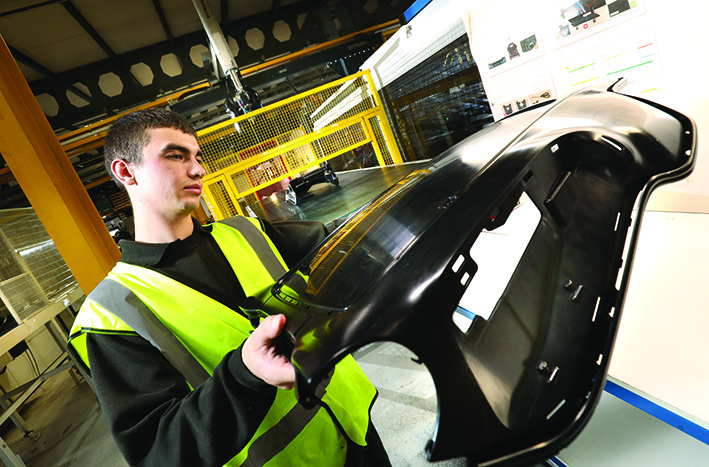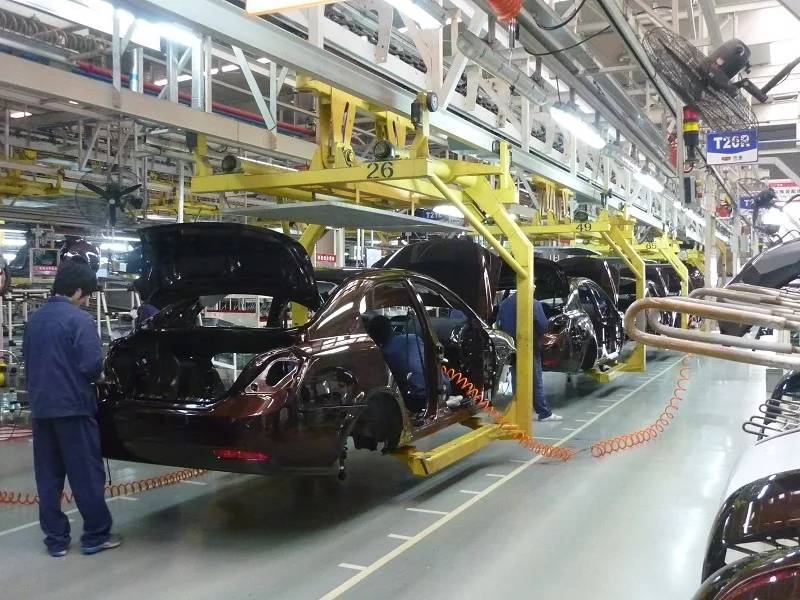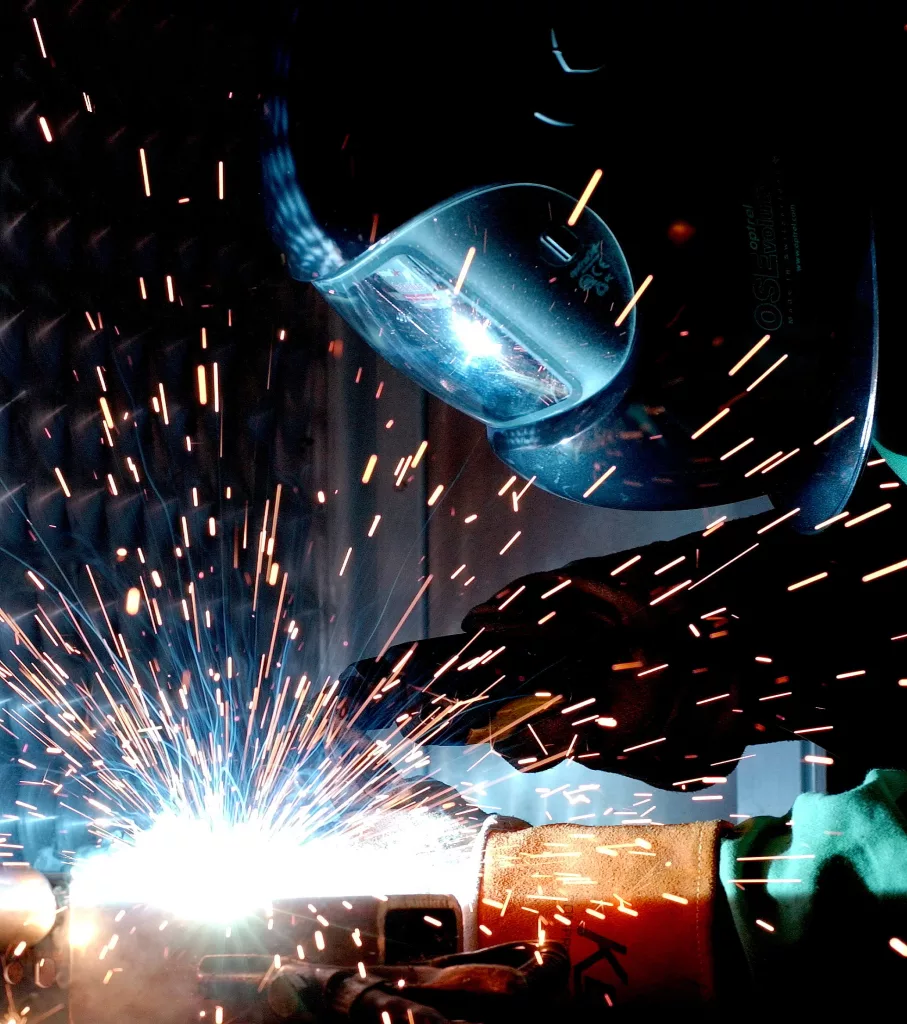Perception of Robotics Needs to Be Changed

After recent reports by the International Federation of Robots (IFR) and the global management consulting firm McKinsey & Co, Tom Bouchier, managing director of Fanuc UK has decided to discuss the state of UK manufacturing. He said: “As explained in the McKinsey report, Artificial Intelligence (AI) can play a key role in improving the global economy, and it is an opportunity that the UK must grasp. McKinsey suggests that there is likely to be a performance gap between companies that adopt AI tools and ‘non-adopters’, so the benefits will be disproportional. “Meanwhile, the IFR says there are just 71 industrial robots per 10,000 workers in the UK, putting the UK behind 14 other European countries and resulting in it being the only G7 country with a robot density below the world’s average of 74 units. “In contrast, Germany — Europe’s most automated country — has 309 units; the Czech Republic, the European country that comes closest to the UK’s tally, has 101 units per 10,000 workers. “It is clear that change is needed. One possible reason for the UK’s ‘low performance’ could be the stigma attached to the use of robotics and unemployment. “If the UK is to catch up with the rest of the world, it is going to need to adopt more automation in its manufacturing facilities and therefore shift this viewpoint — particularly as Engineering UK reported earlier this year that 265,000 skilled entrants are required each year to meet business demand. “In addition to the impact on employment, the costs associated with industrial robotics can also be a sticking point for UK manufacturers, for whom affordability and pricing are often the first questions asked. However, industrial robots often aren’t as expensive as first thought; on many occasions, they are paid off in as little as 18 months. “Moreover, their ability to be reprogrammed means industrial robotics offer long-lasting solutions that go beyond their first use. “It is clear that manufacturing is a going to be a key asset for the UK, if it is to maintain a competitive edge after Brexit. “The UK cannot become just a service-industry economy, and change is required before it slips further behind its global counterparts. Therefore, a culture change in the perception of automation and robotic technology is needed.”
UK to Maintain European Standards Position

The General Assemblies of CEN and CENELEC – the European Standards Organizations – have agreed an arrangement that secures BSI’s full membership post-Brexit. This arrangement confirms that the UK can continue to enjoy and influence the content of voluntary standards that support trade across 34 European member countries. The decisions, taken separately in both organizations, will enable UK industry and other stakeholders to continue their important work shaping and maintaining best practice standards used across Europe and internationally. They also mean that UK experts will continue as chairs, convenors, committee members and policy experts to work on maintaining and developing the 20,000 European standards that are managed by CEN and CENELEC. Both organizations have committed to a transition period for their statutes from the date of Brexit through to the end of 2020, including a derogation for BSI from certain eligibility clauses, during which time BSI will undergo an independent review of its processes and both CEN and CENELEC will agree any necessary revisions to their statutes. This not only secures BSI’s membership from challenge after Brexit, but also the stability of the European standards system during the UK’s withdrawal from the European Union, even in the event of a ‘no deal’ scenario. “We are delighted to have confirmed our continued membership of the European Standards Organizations in the wake of Brexit. This provides stability to British businesses and consumers alike by guaranteeing our participation in the development of European standards, as well as maintaining the level of UK influence over the content of those standards. European standards make up over 50 per cent of our national catalogue of standards, and are crucial to the growth and prosperity of Britain,” said Dr Scott Steedman, Director of Standards at BSI. “We have been a leading nation in the development of standards for over a century, working closely with other countries to deliver better business practices and safer products to consumers. With the help of our fellow members of CEN and CENELEC we are continuing for the next century as well,” he added. This announcement follows UK Government support, pledged earlier this year. In June, Greg Clark – the Secretary of State for Business, Energy and Industrial Strategy – backed moves to assure the UK’s place as a full member of European Standards Organizations, a move that was then supported in the Government’s Brexit White Paper. Over the past 30 years, the identical adoption of European standards by all members of CEN and CENELEC and the withdrawal of conflicting national standards has reduced the number of national standards across Europe from an estimated 160,000 to around 20,000 European standards today. BSI is a member of the IEC, ISO, CEN and CENELEC, ensuring UK expert involvement at all stages of the standards development process. Consensus positions from British stakeholders are fed into the European and international committees, allowing reciprocal market access that underpins 28.4% of annual UK GDP growth.
Advice on Relocation from Omega Plastics

The uncertainty surrounding Brexit is causing a number of boardroom headaches for many companies. However, one leading North East plastics manufacturing firm is saying that now it is the best time to relocate your production work back to the United Kingdom to enjoy significant savings! Omega Plastics, the award-winning Washington-based firm, advises that relocating can reduce costs on logistics, material supply and packaging, while also adding an element of reassurance for the customer that a product is being made in the UK. “The world of manufacturing is all about quality, costs and time. The trick is to find a healthy balance between all three. What we offer at Omega Plastics is a good quality product that can be shipped anywhere in the world. But in these current times of uncertainty when UK companies are being more cautious, then why not look closer to home when placing your next order,” commented Julian Jamieson, Operations Director for Omega Plastics. Omega Plastics, which employs over 150 staff across three regional sites including two factory units in Blyth and Hartlepool, can proudly name Aston Martin, Jaguar Land Rover, Nissan and Honda on its client list; and in 2017, Omega Plastics won Company of the Year at the North East Business Awards. Omega Plastics would like to cast the net out and express to new and existing customers thinking of reshoring “why not knock on Omega’s door”. For example, they have a 1,300- tonne production machine capable of producing plastic components up to a meter square and 5 kilos in weight. The kind of products this particular piece of machinery excels in turning around in high volume are well suited for the automotive, construction, white goods and aerospace industries. The list includes automotive parts from engine covers to seat and fuel system components; large panels for white goods; Heating, Ventilation, and Air Conditioning (HVAC) covers; large structural components used in aerospace; and items for the construction industry (loft hatches, ventilation grills and drain covers). “We have always prided ourselves at Omega Plastics in coming up with the best solutions and delivering the goods. We will explore every avenue of design and technology to produce what the client wants. Once a job has been booked, a team is assigned to create and monitor the production every step of the way. Reshoring doesn’t have to be a chore,” concluded Julian.
Brexit – Ways Manufacturing Companies are Continuing to Grow

Brexit – Ways Manufacturing Companies are Continuing to Grow : As the results were read out on June 24th, a buzz of uncertainty spread around those managing manufacturing companies and how the decision to leave the EU would impact business. Would the changes make a significant impact on import tax paid for products, would foreign workers leave and cause an employment issue? No one knew for sure. However, fast forward ten months and the situation isnât as bleak as many may have initially anticipated. In fact, factory outputs increased by 0.6 per cent in September 2016 â a significant amount more than the 0.4 per cent economists predicted after the Brexit announcement. However, some industries have seen a lapse in growth; oil and gas specifically where output dropped by 3.8 per cent. A third of the UKâs manufacturing firms are reportedly considering leaving the UK amid uncertainty in the market and the value of the pound. Article 50 has, of course, not been triggered yet but the growth we have so far been witnessing in the industry could lapse once this goes ahead and specifics are outlined by Theresa May and the Tory government. These companies are planning the move to countries such as China and India, where labour and land is cheaper and they can greatly benefit from doing business there. Until that time, it still remains that manufacturing companies are seeing growth. Instead of packing up and leaving perhaps the decision should be made to see how Brexit will play out first to ensure the UK economy does not stagnate or see an impact by a mass exodus. The cost of moving location could impact a business more financially than remaining in the UK. But still, only 20 per cent of businesses believe that Brexit is something to be optimistic about. For now, the small amount of growth still taking place in the manufacturing industry is proving lucrative for suppliers for factories and warehouses. After all, as long as factories remain open, equipment will still be required, high quality protective gloves like these from Brosch Direct and PPE are still necessary and the British companies that depend on the manufacturing industry are not being affected. Should the Brexit plans go sour, this will have a ripple effect across a huge number of industries not just manufacturing. Manufacturing companies are growing as the demand for British exports increases, by 8 per cent in October 2016. This means the need for more staff, more products and space, increasing businessâs presence and the manufacturing industry itself. Itâs important that recruitment is also sorted now. If foreign workers decide to leave Britain once Brexit is implemented and they discover that the benefits of living in the UK are revoked, manufacturing businesses need UK workers to fill roles. We should enjoy this period of growth before the uncertainty ahead. Until Article 50 is in place we cannot determine how leaving the EU will affect major manufacturing companies in the UK. Manufacturing & Engineering Magazine | The Home of Manufacturing Industry News
Robert Keen Admits BIFA Is In The Dark On Brexit

This month we’ve heard from Robert Keen, director general of the British International Freight Association (BIFA), about Brexit and it seems one of the UKâs leading industry associations is as much in the dark as Joe Public. Keen was quick to point out the lack of information about possible Brexit implications in his address at the 3-day Multimodal 2017 event in Birmingham. It further underlines Leave votersâ hopes rather than expectations and that a break from the EU is fraught with uncertainty. Keen pointed out numerous so-called facts and figures regarding the UKâs break from the EU but surmised the details are still scratchy. Indeed, despite working closely with Government to represent, promote and develop BIFA membersâ interests, the organisation was similarly in the dark about the prospects of a Britain sans the European Union. We, like most people, have heard all sorts of facts and figures, but really we donât know any more than we did on June 23, said Keen. “We have tried not to speculate too much as we donât know very much. Keen admitted BIFA remains in frequent discussions with Government over the implications of Brexit but had yet to learn definitive answers on pertinent questions. BIFA, which is a member of the JCCC, the body which looks after customs legislation in the UK, said that it was important that the UKâs border remains as frictionless as possible, maintaining seamless port operations, and not throwing away 40 years of work to align systems with the rest of Europe. For example, the Single Transit Contract remains a hot topic. The sector would like to retain it so that, for instance, a consignment from London to New York via Paris, London would remain the port of EU export. As with everything else Iâve written about Brexit over the last few months – we sit, we wait, we wonder. Manufacturing & Engineering Magazine | The Home of Manufacturing Industry News
Britain’s Car Manufacturing Establishments Are On The Way Up!

British car manufacturing has received an exciting boost, hitting a seventeen year high in February. Overall production in the industry rose eight percent (to 153,041) last month and boosted by a thirteen percent increase in sales to overseas markets. Since Brexit the fifteen percent fall in the pound against the euro has helped make British exports cheaper to foreign buyers. Simultaneously this has increased the cost of importing from the continent for UK-assembled models. Throughout February UK production lines turned out one car every sixteen seconds! These exciting figures show the illustration of continuing global popularity of British built vehicles which is providing a smile in both the car manufacturing realms and the national economy. One out of every ten cars made in Britain is thought to be manufactured for the international market with half of those being for customers in the EU. Britain is determined to avoid barriers in trade and remain building a reputation as a fair free trading country. Car production in Britain has crossed the 300,000 mark for the first time in fifteen years in the past two months alone and it is causing an uplifting stir amongst those in the industry. This exciting news follows last weekâs announcement by Toyota who stated they would invest £240million ($300m) to upgrade their Burnaston plant near Derby. The Japanese car maker insisted their factory would be modernized, provided with new technologies and equipment and be able to manufacture vehicles under their new global architectural platform. There are still the fears of competitiveness of the British automobile establishments that will continue over the next two years, but the recent boosts are a positive leap forward for Britain and the car manufacturing industries. Manufacturing & Engineering Magazine | The Home of Manufacturing Industry News
Brexit Blessing for the Manufacturing World

Brexit Blessing for the Manufacturing World : Thanks to the weaker status of the pound manufacturing has reached a two-year high! As Britain gears up to leave the European Union it appears the weaker pound has boosted overseas demand for British goods. Export order books are at levels last seen in December 2013. This demand is particularly high in the pharmaceutical and mechanical engineering sectors. Project fear has left some in great worry that leaving the EU will be disastrous for British trade but the alternative is what could very well be the reality. As the EU becomes more centralized and controlling we have seen rising prices in agriculture and manufacturing by an average of ten percent. The prices of a variety of items could be seen to drop due to more freedom of trades deals from BMWâs to Brie. Britain was once a nation that traded freely across the globe and Brexit is allowing for the UK to join the current global market as a free trading nation being able to buy goods at the cheaper world prices while selling their goods without extensive taxing. Trading barriers will no longer create a wedge between Britain and the world prices that havenât been accessible for many years. If we take for example French Farming, when they sell a meat or dairy product to the UK, the tax stamp added for EU trade increases the price of the item leaving the buyer out of pocket. The UK can now stand on its own two feet and help their own farmers who may be struggling while simultaneously protecting the rural environments. Prices are believed to fall by eight percent. The economy is believed to boost by at least four per cent and a huge seventy per cent of UK trade takes place outside of the EU. (Especially in services such as law, advertising and education.) It appears Manufacturing and global trade will go hand in hand for an economy boost and we can be hopeful this will increase across the next two years and beyond. Manufacturing & Engineering Magazine | The Home of Manufacturing Industry News
How Will Brexit Affect British Engineering and Manufacturing?

Post Brexit Britain is a place that is scary for many, people are in fear of what will affect them and to what extent, or if it will affect them at all. In terms of manufacturing and engineering, there are the positives, the negatives and still the unknown… An obvious impact of the referendum is the sterlings rapid depreciation against other currencies. This in fact makes exports cheaper, so buying British goods becomes more attractive to foreign purchases who suddenly realise their currency will go a lot further than in previous years. Essentially this might mean we are giving other countries a bargain when we can’t really afford too, but this will give Britain a short term boost for the internal market. Manufacturers are becoming more likely to source components for products domestically, as buying from abroad becomes a little more expensive. Sourcing components from local manufacturers means cars can claim back the old-Made in Britain statement which could lead to interest from companies abroad in the long run. Since the financial crisis and dark days of 2008, production seems to have declined slowly since the all time record set in 1972. Now, new technology, models and investments, even new company owners are aiming to put this depressing trend in reverse! There have been predictions that the UK could speed past the previous record and hit 2m for the first time in the next three years. That’s exciting news for all, with approximately 160,000 people employed in the vehicle manufacturing business and a total of 800,000 across the wider industry it certainly seems that Britain’s car industry is in high gear, although this was also the case before brexit, with most manufacturers voting remain, so there is some obvious remaining concern. Brexit present unprecedented opportunities that will increase trade deals that are of benefit to both the UK and foreign partners. There are already steady reports in gains of revenue and profit as we approach mid 2017. The result was unexpected for the business and people are still trying to get their head around the change, the main disadvantage to the industry being the time it takes to negotiate new sales strategies to the rest of the world outside of the brexit drama. The Royal Academy of Engineering has revealed a heavyweight analysis of both the threats and opportunities the referendum has brought with it, which include the need to maintain a supply of skilled labourers. Those in the industry are aware this is a critical time for Britain’s engineering sector with plans for a new industrial strategy being announced after the referendum took place, people are in high indications that the government realises how important engineering and manufacturing are to the overall economy. Making up approximately 10% of the UK’s economy and contributing approximately 280bn gross added value (which leads to about 20% in total) means these two industries must not be overlooked for Brexit to be a success. The Academy has warned a lack of skilled staff in the UK is trumping their other concerns and are determined more time and money should go into the encouragement of young people to follow in the field. Hiring people from all over the world, not just Europe needs to be made easier to fill the void of skills that Britain seem to suffering from. This is putting politicians in a difficult spot of trying to satisfy voters desires to control immigration but simultaneously support the crucial engineering sector who need more variety of staff, skills and knowledge. It appears that Brexit can have many positive advancements for both the manufacturing and engineering trades, but in order for those benefits to become clear the industries need to work on the issues that remained before the referendum. The new wave of manufacturing and engineering will be able to come forward and be bigger and better than ever, predictions for the next half decade are very exciting and the industries need to remain positive in times of uncertainty and continue doing what they do best. Manufacturing & Engineering Magazine | The Home of Manufacturing Industry News
10 Reasons Brexit Is Good For Manufacturing & Engineering

10 Reasons Brexit Is Good For Manufacturing & Engineering : Forget Brexit means Brexit. Brexit means prosperity, jobs and opportunity, a thriving economy and, importantly, a strong manufacturing and engineering sector in the UK. The Brexit hangover is affecting everyone differently, and while many are thrilled with the result there is still mass concern over how the referendum will affect people and their businesses. Although people have the right to worry it can be easy to forget there are many positives that come with a big change, even if they might not be immediate. So here are the top ten reasons Brexit is a good thing, and how it will positively impact the manufacturing and engineering trades… Itâs important to remember the facts: in order to keep people in jobs and raise wages of workers, there has to be a competitive economy. Britain is firmly rooted in that competitive economy and while Brexit may have had an effect on the sterling, the economy industry remains for the UK. South Korea, miles and miles from the EU has a prosperous nation that exports in electronic goods and cards on a global scale (including the EU) while Greece is a full EU member and is fundamentally uncompetitive, which has lead to various financial problems within the country. For engineers and manufacturers the concept of leaving the EU does not mean workers are under immediate threat, there are still accepted in that competitive economy which is exactly where they need to be! Britain has the pound. The pound may look like a poor coin once loved now forgotten and is becoming increasingly `worthless` but the fact remains the pound has never quite suffered the existential crisis the Euro has and is likely to suffer again. The diplomatic pressure to join the Euro would eventually intensify (again) while without it manufacturers can use the pound to their advantage, even though the sterling has been depreciated and devalued it remains a staple part of british business. Trade deals with other countries may be easier to win! Britâs have an ability to negotiate and agree, we’re not a country to quarrel and can raise points in a professional manner that often works in their favour. Britain has traded with the world while in the EU and before the EU was invented, and can do so again! Britain can still have immigration. Immigration is a touchy subject, but Eastern European immigration raised British economic growth and made the country richer. Issues arise with political and personal acceptability, and the worry of economic costs outweighing the benefits. Britain can benefit from opening its doors to a worldly culture, engineers are in fear that their skills are lacking against other countries and bringing people from different backgrounds with different knowledge could have huge advancement on British industry. On a more general note Britain can create planned, rational immigration laws that can bring nurses from Zimbabwe, refugees for Syria, students from China and builders from Albania all of whom help to keep Britainâs work ethic and economy strong and competitive. We live in a venerable and stable democracy. While this may seem a little pompous, not all of Europe has the political stability others do. The monarchy is a visible and worldly known symbol for British democracy and economy that leave plenty to be desired and leave an interest lingering in Britain and British businesses. Manufacturers will have more freedom. The EU has become more regulating and centralizing which is the exact opposite of what the world needs in terms of jobs and future success. Countries wishing to succeed in the future global economy need to be flexible, adaptable and in control of their own destiny. Brexit will actually allow this to be a lot more accessible than remaining in the EU would, certain EU laws override British laws and Britâs no longer have to worry about that problem, they can have and use their own laws in a diplomatic society where workers have a say in how their industry works. The EU needs us more than we need it. Systems and businesses are supposed to operate within the blocâs Single Market mechanism as an EU member. This is a one territory zone without internal borders, which essentially means all those in the EU must operate as one trades unit. Operating as one sounds like a utopian ideal but sadly the system has not worked, at least not for the UK. Britainâs growth performance has had more in common with the economic recovery in the US than the Eurozone which essentially means we donât need the EU to have successful trade deals, they need us. This is great news for manufacturing and engineering establishments who have more free reign over their trade and can increase sales more than in previous years. The EU is not doing well. When Britain joined the EU in 1973 economy was booming, with the EU making up 37% of gross domestic product (PDC) whereas by 2025 the EU will only account for 22% of GDP and is falling more and more behind other competitive countries. Greece (sorry to use it again) is a solid example of what can go wrong. This means by leaving the EU manufacturers and engineers have the chance to excel and make a difference not only within the establishments, and not only for the UK but for the world PDC! Britain is still sitting pretty! Even with the brexit blows, unemployment stands at a mere 5.5%, wages are rising and people are being able to access the housing ladder easily. Britain is one of the key financial centres in the world and now has the chance to hugely improve that status, businesses need to realise that and use to their full advantage! Britain has the freedom to decide its own destiny. This has been touched upon already but it really is vital to remember it! Britain has control of its own borders, does not have to listen to EU judges
John Moylan Says UK Must Brace Itself For Brexit Woes Despite Toyota Making Britain Part Of Its Long-Term Future

John Moylan, the BBC’s car manufacturing correspondent, says the UK must brace itself for Brexit woes despite Toyota making Britain part of its long-term future. The BBC’s car manufacturing correspondent John Moylan says, despite Toyota announcing plans to upgrade its UK plant with its New Global Architecture, its new system for producing vehicles worldwide, UK car manufacturing must brace itself for Brexit woes. Moylan said that Toyota’s decision suggested the company saw the UK as playing a major part in its global activities but “the UK’s automotive industry knows that Brexit is coming and with it the possibility of tariffs and complex customs arrangements. That threatens the competitiveness of carmakers that rely upon the kind of just-in-time manufacturing which Toyota pioneered.” Moylan’s comments come after Toyota announced that its Burnaston plant in Derbyshire will be boosted by a £240m investment as the production facility is upgraded to its new global platform. Toyota, like other carmakers, have previously enjoyed tariff-free access to the EU and will hope to continue to do so following Britain’s split. This has been important for the Burnaston facility as more than 85% of its output is shipped to mainland Europe. The news of major investment comes as a massive relief to the thousands of workers employed at the facility. But it also suggests optimism post-Brexit. Dr Johan van Zyl, the president and Chief executive of Toyota Europe, said: “We are very focused on securing the global competitiveness of our European plants. This upgrade is a sign of confidence in our employees and suppliers and their focus on superior quality and greater efficiency.” He welcomed a £21m contribution from the UK Government as part of the investment. This “Demonstrates that, as a company, we are doing all we can to raise the competitiveness of our Burnaston plant in Derbyshire. Continued tariff-and-barrier free market access between the UK and Europe that is predictable and uncomplicated will be vital for future success.” “In essence, the £240 million will be spent on upgrading Burnaston’s equipment and systems – rather than adding to the firm’s 3,100-strong workforce,” said the Derby Telegraph’s Robin Johnson. “Toyota is looking to standardise many of the components and processes it uses across its factories – which collectively will help it to produce “This kind of forward-thinking will hopefully off-set any nasty shocks the company may encounter if the UK is unsuccessful in its export tariff negotiations with the EU. It is clear that the top brass at Toyota think very highly of the Burnaston factory and its UK workforce. Back in 2015, they decided to entrust the factory with the production of an updated version of the popular Auris hatchback and the all-new Avensis. Of course, this was all before there was any talk of Brexit.” Business Secretary Greg Clark said Toyota’s investment “underlines the company’s faith in its employees and will help ensure the plant is well positioned for future Toyota models to be made in the UK”. Manufacturing & Engineering Magazine | The Home of Manufacturing Industry News



